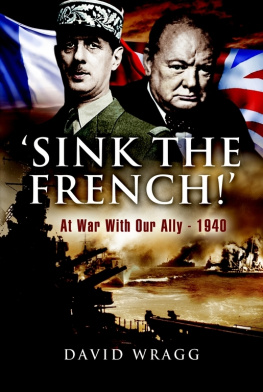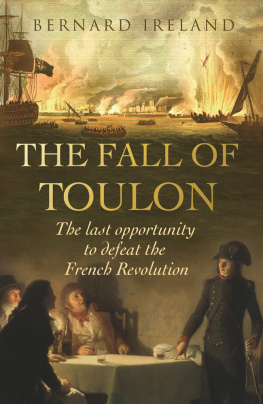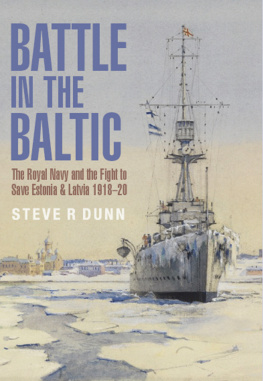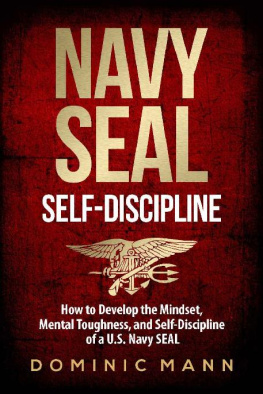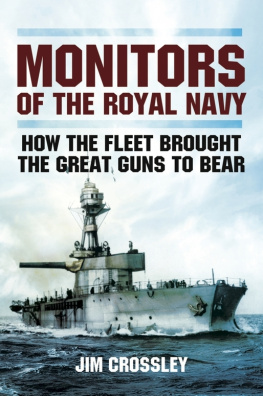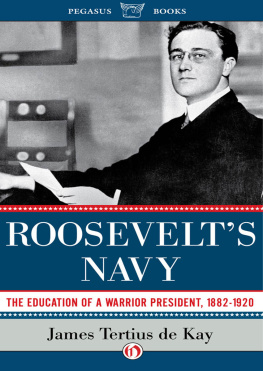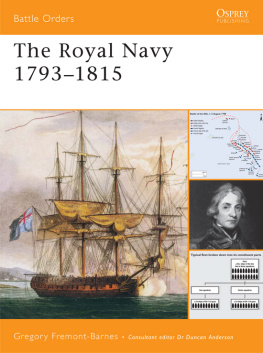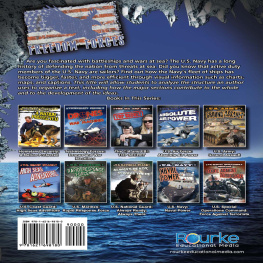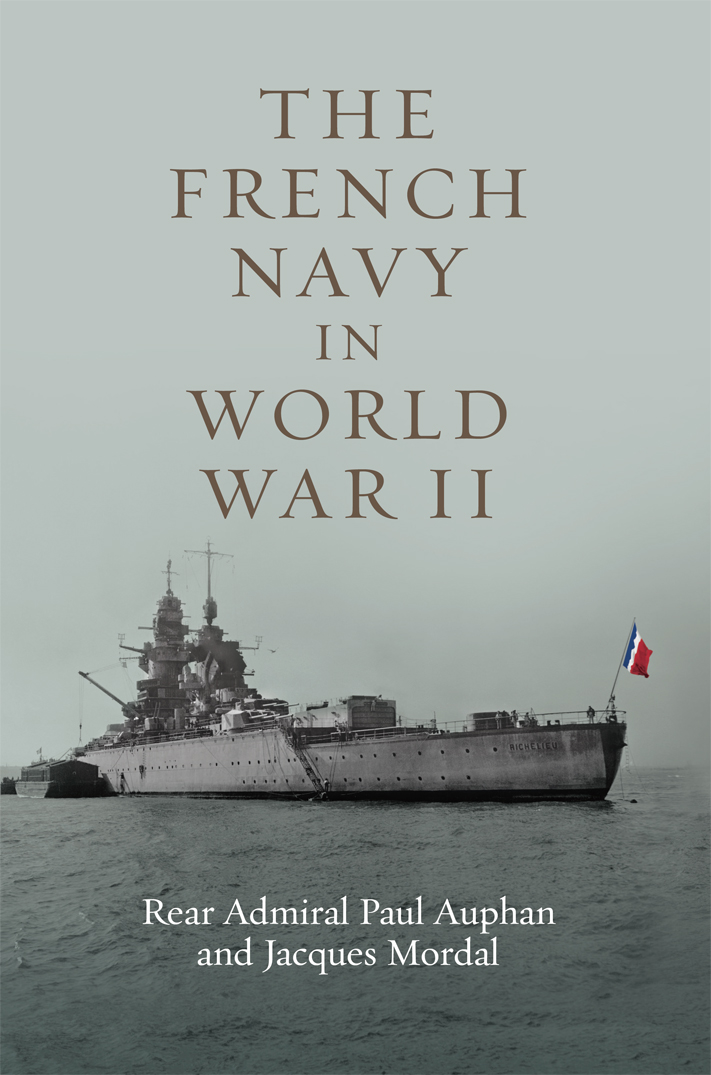

Naval Institute Press
291 Wood Road
Annapolis, MD 21402
1959 by United States Naval Institute
All rights reserved. No part of this book may be reproduced or utilized in any form or by any means, electronic or mechanical, including photocopying and recording, or by any information storage and retrieval system, without permission in writing from the publisher.
First Naval Institute Press paperback edition published in 2016.
ISBN: 978-1-68247-060-2 (eBook)
Library of Congress Catalogue No. 59-8595

 Print editions meet the requirements of ANSI/NISO z39.48-1992 (Permanence of Paper).
Print editions meet the requirements of ANSI/NISO z39.48-1992 (Permanence of Paper).
24 23 22 21 20 19 18 17 16 9 8 7 6 5 4 3 2 1
First printing
Seldom in the history of a great nation has the fate of a Navy been so tragically involved in political events as in France during the course of the Second World War.
Heir to a past which dates back to the Crusades, the French Navy had previously experienced many painful vicissitudes. Not one was to equal that of 1939-1945.
After having efficiently contributed to the rescue of the French Army at Dunkirk and removed from reach of the enemy everything that floated in the Atlantic harbors, the Navy, like all Frenchmen, had its heart crushed by the tragedy of defeat. The causes of it were complex. The only chance to recover was to remain united. Faithful to its traditions, the Navy remained in the ways of discipline consistent with the promise it had given the Allies. While waiting for the day when the United States of America could come to the assistance of Europe, it maintained the empire welded to the mother country, revictualled the unhappy French and safeguardedoften under very difficult conditionsthe French heritage overseas. That long martyrdom led to the scuttling of the French Fleet at Toulon on the 27th of November, 1942. On thus scuttling half of its Fleet, the Navy amputated one of its limbs, but saved its soul. No matter the separate ways they had pursued under the shock of events, all of its seamen could now, in a spirit of unanimity, return to the fight. They participated in the final victory to the best of their abilities. It is not their fault if their heroic actions did not end in unity.
Such is the story, not well known, even in France, and often misunderstood, that Admiral Auphan and Jacques Mordal narrate in this book. Few men could tell the story so well because each of them, after having actively participated in the war at sea, continued under the German occupation to oppose themselves to the Germanization of our country.
I do not forget the services rendered by Admiral Auphan, Deputy Chief of Staff of the French Admiralty, when he proceeded to Dover, somewhat at my request, to organize the revictualling and later the evacuation of the French divisions at Dunkirk, or each time an occasion presented itself to the Navy, during the Battle of France, to come to the aid of the Army. Neither do I forget the assistance he gave me after the armistice, when I did my utmost to reconstitute, in secrecy, the Army of Africa. Before being arrested by the Gestapo, in November, 1942, I was a witness to his efforts, as Minister of the Navy, to save the Fleet. Nobody is more qualified to express the state of mind of the Navy during the entire tragedy than Admiral Auphan himself.
His collaborator, Jacques Mordal, was blown up on a mine at the time of the evacuation of Dunkirk and was seriously wounded. He has been mentioned several times in dispatches, once for work in the Resistance. He has now dedicated himself to the study of history, in particular that of the Second World War. His books speak with authority. Their objectivity and their accuracy have never been questioned either in France or abroad.
I must compliment the United States Naval Institute for publishing a work indispensable to whoever wishes to understand, without a preconceived idea or made-up mind, the history of the six years which shook the world. But I know the two authors well enough to be certain that in stating merely the truth, they have aimed at a better thing yetto strengthen the traditional bonds of friendship which unite us with the United States of America and to promote an understanding between the two shores of the Atlantic, the better to defend civilization.

MAXIME WEYGAND
General, French Army
Member of the French Academy
Paris
November 10, 1957
The Second World War has probably been the most trying period in the history of the French Navy. Aside from the material hardships, it was the unhappy outcome of the 1940 campaign, the armistice, the occupation of the homeland, and the war that continued which brought the Navys corps of officers face to face with tragic problems of conscience. Their behavior in these times of crisis gave rise to hasty judgments, which were the result of exaggerated propaganda, and which history is already in the process of revising.
It was not in order to defend a particular attitude that we undertook to write this book. We did so, rather with the conviction that only a strict presentation of the facts could explain the different stands taken, clear up misunderstandings, and reconcile divergent opinions.
Perhaps it would have been desirable for such an account to come from a historian who had no part in the tragedy, whereas both of us were deeply involved in it. But, apart from the fact that events are often incomprehensible to those who have not lived through them, we do not believe that our having stayed with the majority in the path of discipline prevents us from understanding those who, under very difficult circumstances, elected to do otherwise.
One of the authors having been chosen by destiny to hold high positions in the Government, a respect for the truth has constrained us not to conceal either the deed or the thought. We have endeavored to write objectively, with the serenity allowed by the passage of time, and without giving our book the appearance of pleading a cause or of justifying it.
The facts which we report have been assembled and verified during the course of long years of research, reading, and thought. If at times our experiences have permitted us to add our personal testimony, we have not stated anything that cannot readily be documented. We could have increased, ad infinitum, the number of footnote references. We purposely limited these in order to make the book more readable by avoiding frequent interruptions in the thread of the story. Beyond our personal recollections, one or the other of us was able to have long discussions with most of the leaders who were directly involved in the events related. These discussions have clarified and filled out the picture of events resulting from a study of official records. Such discussions, checked against the innumerable personal accounts published in France and abroad, in Allied as well as in enemy countries, have brought us special advantages which other less favored authors might not have been in a position to obtain.


